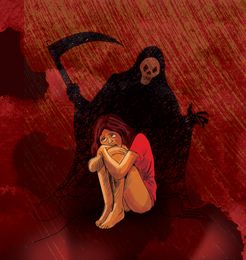I am sensing some ennui in the reportage around the horrific rape and murder at the R.G. Kar Medical College. Perhaps it is just me, but it seems that the media, while putting on their grimmest faces and asking—‘how many girls will have to die horrible deaths before we fix ourselves as a society?’—seem to be mouthing this often-repeated line a little mechanically. There is a sense of simply going through the paces, before moving on to something more ‘important’ and ‘substantial,’ like the prime minister’s visit to Ukraine, say, or the state of the stock market.
Politicians, while claiming to care, seem to be indulging either in tokenism or opportunism. Regular folks are disheartened as well. Because we have held candlelit marches for Jessica and we have protested for Nirbhaya. No One killed Jessica and Delhi Crime have been produced, released, watched and awarded. The Nirbhaya gang rape and murder ended Sheila Dikshit’s reign in Delhi and ushered in the newer, ‘cleaner’ government of the Aam Aadmi Party. We did our bit. Or did we?
Because even though public opinion was quick to condemn Tarun Tejpal, one year after Nirbhaya its support for abuse survivors definitely waned by the time #MeToo came to India. We waited eagerly to see if Bollywood’s #MeToo moment would throw up any big names, rumours about whom have circulated in the industry for decades, but when this did not happen, we were quickly tired of it. Priya Ramani, the courageous journalist who called out M.J. Akbar as a sexual predator, fought a lonely battle, mostly.
There was a sense that women were ‘making too much of an issue out of something quite small’. They were ‘being difficult’. They were ‘playing the woman card’. And what about men’s rights, huh? What about the future of young boys who innocently ‘misread’ the signs sent out by fickle-minded teases who wore small clothes, put perfume, and ventured out after dark, and then withdrew their consent at the last moment?
I was on a channel debate some time during the 2010s, where, upon being asked why these tragedies kept happening, I had said that it was because no politician wanted to alienate the ‘rapist vote bank’. This alarmist conspiracy theory was laughed off by both the anchor and my fellow-panellists.
But there is a ‘rapist vote bank’. You could also call it the patriarchy, and it cuts across all castes, faiths and socioeconomic categories. It is the reason why men with crimes against women get tickets, win elections and enter Parliament. It is why people like Brij Bhushan Sharan Singh and Prajwal Revanna and their families stay relevant.
The ‘rapist vote bank’ actively fosters rape culture—that is a society that normalises, condones and even admires hyper-masculine, the act of degrading and dehumanising women. This happens in a million big and small ways. If we call out any of these ‘small’ things, we’re labelled alarmist, problematic and hysterical. If we demand that something be done about the relentless, endless barrage of rapes, eyes are rolled, and we are called nags. In fact, the trope of the nagging woman is the one that is weaponised the most against us. But what is nagging except for persistence?
We need to persist now like never before. We need to persist, not mechanically, but with a vengeance and zero tolerance. We need to send out the message to all stakeholders that the feminist vote bank is larger and more influential than the ‘rapist vote bank’. Ignore it at your own peril.
editor@theweek.in


